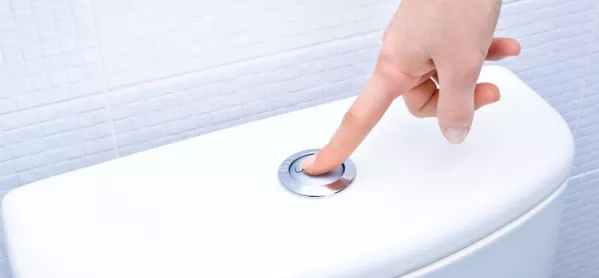In my school, there is a sign on the door of each of toilet cubicle in the ladies’ toilets that reminds people, in a passive-aggressive kind of way, to wipe your bum and flush. This is just in case, after two or more decades of being alive, you weren’t already aware of decent toilet etiquette.
And has there been an improvement in the condition of said loos since the signs were put up? Good grief, no.
I think, though, that these signs do tell us something about teaching as a whole and the way that those of us in this profession are constantly dictated to over tasks that we should be trusted to perform perfectly well on our own.
As a teenager I used to love buying Viz, the Beano-esque comic with a twist strictly for adults. I remember one Viz comic strip about the “Bottom Inspectors”, a band of highly-trained, terrifyingly intrepid men in uniform who checked whether people had wiped properly. The hapless owners of neglected bums would tremble in fright as they were lined up and told to “drop ‘em”.
There are certainly parallels to be drawn here. Terrifyingly punitive, untrusting, omnipotent control freaks can judge and condemn a hapless colleague or a school that has experienced a minor lapse and an unexpected dip in results. Nowadays, it only takes one poor lesson, a temporarily neglected pile of books or an undifferentiated piece of extended writing to bring the wrath of a senior leader or inspector.
Surely there is no better way to suck the joy out of a career as unpredictable, imperfectly human, diverse, multi-dimensional and creative as teaching than by continually monitoring teachers and looking out for minor lapses in a job that is all too often beyond our direct control anyway.
Has accountability gone too far?
Sometimes, allowing the kids to fail can actually be a positive thing. We can build resilience by setting a question without (gasp!) a writing frame. We can allow them to take risks and come up with their own solutions to help build long-term skills like problem-solving and taking the initiative; exactly the types of skills that business leaders complain that our students are lacking, because we’ve spoon-fed a generation into a position of learned helplessness.
Just as the signs in the loos do not seem to have an impact on cleanliness, I question whether the level of scrutiny applied to the work of teachers improves student performance. Does constant monitoring of grades, books, behaviour and differentiation really improve standards? Do spot inspections mean “cleaner bottoms”? Is being caught out a deterrent to that “naughty” teacher who wants to put his own kids to bed once a week, or collect her daughter from the child-minder herself every Friday as a special treat? Of course not. Teachers are adults and professionals. They should be allowed to sort themselves out.
Last month, the Education Select Committee appeared to acknowledge the vast retention crisis eating away at UK schools. So what now? More bursaries and glossy advertising campaigns to tempt graduates into the profession only for a third of them to leave after five years anyway? Rather than cranking up pressure through inspections and pointing the finger at slack performance, political predecessors or getting the Ofsted bullies to make us “drop ‘em”, why not back off and allow us adult professionals to pull the handle, pass the hand gel and let us do what we have been trained - and should be trusted - to do without having to submit to the relentless humiliation of the Bottom Inspectors.




